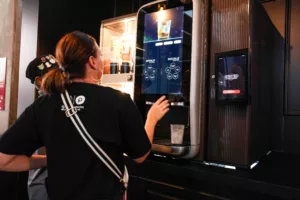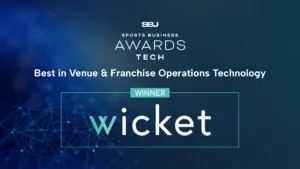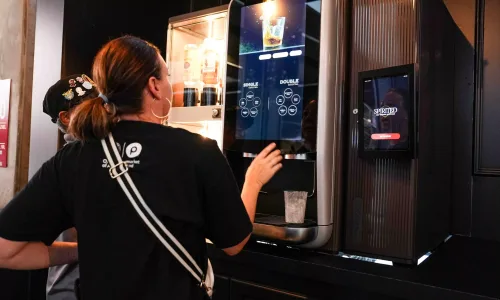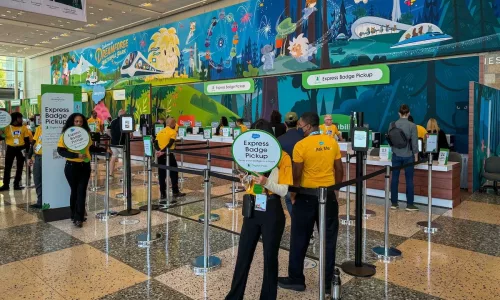across the league for a taste of the athleticism and excellence live soccer can deliver. In 2023, the average attendance per match hit a record high of 22,111—a 5% increase from the previous year.
This excitement reached a fever pitch on July 4th, 2023. The LA Galaxy vs. Los Angeles FC match at the Rose Bowl shattered attendance records, drawing in over 82,000 fans. This momentous occasion coincided with the much-anticipated debut of the league’s first global superstar (Lionel Messi!), and with the 2024 Copa America and the 2026 World Cup on the horizon, MLS clubs are going to see unprecedented revenue increases through ticket sales, concessions, and merchandise purchases.
However, with more people than ever coming to games, clubs will have to find innovative ways to manage all the logistical problems in order to capitalize on the opportunity. Biometric authentication software systems—which include iris authentication, fingerprint scans, and facial authentication—are offering incredible possibilities for maximizing revenue while accelerating lines and concessions. But which biometric authentication solution is more convenient for the fast-paced environment of a live soccer game? This choice will be crucial for clubs to maximize the benefits of their investment.
That’s why we’re breaking down what biometric authentication software is, how it can revolutionize the MLS fan experience, and separating the more effective solutions from those that might be less practical in a stadium setting.
Understanding Biometric Authentication
Biometric authentication is a technology that relies on unique biological traits such as fingerprints, facial features, or iris patterns to verify a person’s identity. Once a person’s profile is created, it can be linked to various other data points like tickets or payment information to add speed and a layer of security to a variety of transactions.
When users arrive at an entry or transaction point equipped with biometric authentication technology, a quick image or touch is all it takes for these systems to measure a particular feature, crosscheck it with existing profiles, and confirm who they are. As a result, these technologies are typically fast, simple to use, and can save operators resources across a variety of use cases. Also, biometrics offer a more secure 2-factor authentication layer as well as extra convenience for users and staff members.
Common Biometric Authentication Systems
There are three categories of biometric authentication software systems available for stadium applications, but not all of them are well suited for the fast-paced, dynamic environment of a live sporting event. Fingerprint scanners, for example, are highly reliable, but they require everyone to physically touch the scanner, which is unsanitary and impractical on the scale of an MLS game. They can also get dirty quickly, and if it’s cold, fans will need to remove their gloves and shiver through the experience.
Iris scanners are extremely accurate since no two sets of eyes are alike. They’re an excellent choice for applications like airport security that require precision and deliver a highly controlled and consistent environment. Unfortunately, users often have to position themselves at a precise distance from the scanner. It can be extremely time-consuming and finicky, and it’s particularly inconvenient for the energetic vibe of a live sports event.
Fortunately, facial authentication is the perfect solution for the atmosphere and needs of stadium operators. These platforms measure the unique facial profile of each user and can confirm identities in 300 milliseconds with a simple picture of a fan’s face. They work well in a variety of environments, and the top systems deliver 99.7% accuracy with a 0% reported false positive rate.
Picking the Right System for MLS
The success of biometric authentication hinges on choosing a platform that aligns with the unique dynamics of MLS operational needs to provide a seamless experience for fans. Here’s why selecting the right system is critical:
- Security and Accuracy: The chosen system must offer robust security measures to protect sensitive fan data and encourage participation. Fans can opt in or out of service at any time, so the biometric authentication software MLS clubs select needs to have an excellent track record of speed and accuracy.
- Scalability and Throughput: The system should efficiently handle large crowds, especially during peak hours. To maximize the value of a club’s investment, it should also be simple to onboard and offer flexibility for a variety of use cases.
- User Experience: A user-friendly system is key. Fans should be able to navigate the authentication process quickly and effortlessly—in fact, it should be a fun and anticipated part of going to a live game!
Key Benefits for MLS Clubs
By using biometric authentication software leveraging facial authentication, MLS clubs can improve the fan experience at their games while simultaneously boosting revenues. These systems use off-the-shelf hardware, so they’re easy to onboard and deploy, and they can deliver benefits across a range of stadium pain points, including:
Accelerating Entry Times
Biometric authentication software can dramatically reduce wait times at the gates, and facial authentication systems are leading the way with 4x faster entry time than traditional lanes. By eliminating long lines, fans will have more time to explore the stadium, buy food and drinks, and enjoy the game.
Shortening Concessions and Merch Lines
Nobody wants to miss a legendary highlight because they’re stuck in line buying concessions, and a survey report from Oracle has indicated that 58% of fans would actually spend more money if they didn’t have to wait in line. Knowing ahead of time that getting a snack isn’t going to cost them much game time makes a concessions trip much more appealing—especially for families with children. When they get there, biometric authentication streamlines payments, significantly reducing lines and allowing vendors to serve more customers and make more revenue. Quicker transactions also create opportunities for impulse purchases. Fans with shorter wait times may be more inclined to grab an extra drink or snack before returning to their seats.
Additionally, the top sports leagues are already investing in a variety of technologies to address the problems of long lines and slow transactions, and biometric authentication software can augment existing investments. By adding speed to systems like self-serve kiosks, these integrations deliver the best possible ROI.
Ease of Access
MLS games bring all kinds of people to the stadium for a host of different reasons, and biometric authentication software is flexible enough to handle a variety of different credentialing and access issues. Whether it’s staff, players, general admission, the media, or VIPs heading to premium live-game experiences, these systems make all stadium access points fast and secure.
Why Facial Authentication Is the Winning Play for MLS
By implementing a best-in-class facial authentication system, MLS clubs can elevate the fan experience while making the most of the revenue opportunities the league’s success presents. Biometric authentication software featuring facial authentication technology delivers faster entry, shorter concession lines, and a more secure environment, creating a more enjoyable and memorable game day for everyone. The clubs that leverage it in upcoming seasons will quickly find themselves ahead of the competition in terms of profitability—and they’ll be in a league of their own in the eyes of their home crowd.
Learn more about how facial authentication is revolutionizing sports clubs everywhere with an ideal biometric authentication software solution to the unique challenges of live games and events.







